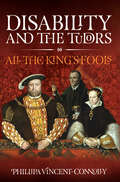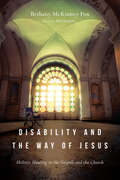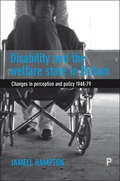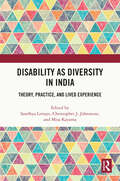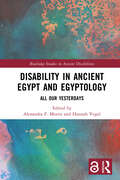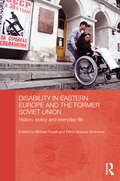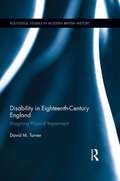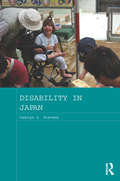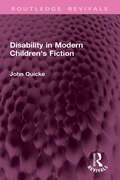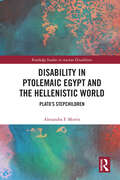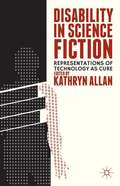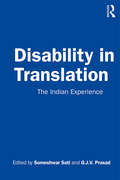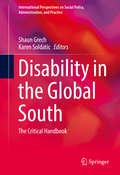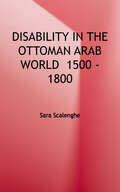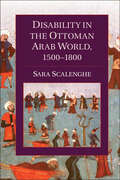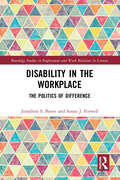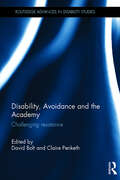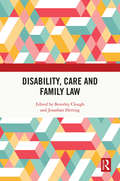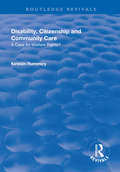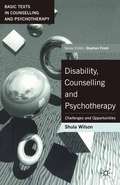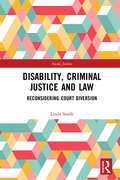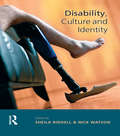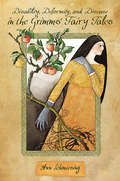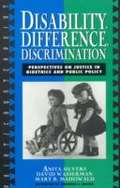- Table View
- List View
Disability and the Tudors: All the King's Fools
by Phillipa Vincent ConnollyThroughout history, how society treated its disabled and infirm can tell us a great deal about the period. Challenged with any impairment, disease or frailty was often a matter of life and death before the advent of modern medicine, so how did a society support the disabled amongst them? For centuries, disabled people and their history have been overlooked - hidden in plain sight. Very little on the infirm and mentally ill was written down during the renaissance period. The Tudor period is no exception and presents a complex, unparalleled story. The sixteenth century was far from exemplary in the treatment of its infirm, but a multifaceted and ambiguous story emerges, where society’s ‘natural fools’ were elevated as much as they were belittled. Meet characters like William Somer, Henry VIII’s fool at court, whom the king depended upon, and learn of how the dissolution of the monasteries contributed to forming an army of ‘sturdy beggars’ who roamed Tudor England without charitable support. From the nobility to the lowest of society, Phillipa Vincent-Connolly casts a light on the lives of disabled people in Tudor England and guides us through the social, religious, cultural, and ruling classes’ response to disability as it was then perceived.
Disability and the Way of Jesus: Holistic Healing in the Gospels and the Church
by Bethany McKinney FoxWhat does healing mean for people with disabilities? The Gospels are filled with accounts of Jesus offering physical healing. But even as churches today seek to follow the way of Jesus, people with disabilities all too often experience the very opposite of healing and life-giving community: exclusion, judgment, barriers. Misinterpretation and misapplication of biblical healing narratives can do great damage, yet those who take the Bible seriously mustn't avoid these passages either. Bethany McKinney Fox believes that Christian communities are better off when people with disabilities are an integral part of our common life. In Disability and the Way of Jesus, she considers how the stories of Jesus' healings can guide us toward mutual thriving. How did Jesus' original audience understand his works of healing, and how should we relate to these texts today? After examining the healing narratives in their biblical and cultural contexts, Fox considers perspectives from medical doctors, disability scholars, and pastors to more fully understand what Jesus does as he heals and how he points the way for relationships with people with disabilities. Personal reflections from Christians with disabilities are featured throughout the book, which concludes with suggestions for concrete practices adaptable to a variety of church settings. Bridging biblical studies, ethics, and disability studies with the work of practitioners, Fox provides a unique resource that is both theologically grounded and winsomely practical. Disability and the Way of Jesus provides new lenses on holistic healing for scholars, laypeople, and ministry leaders who care about welcoming all people as Jesus would.
Disability and the Welfare State in Britain: Changes in Perception and Policy 1948–79
by Jameel HamptonCreated during and after the Second World War, the British Welfare State seemed to promise welfare for all, but, in its original form, excluded millions of disabled people. This book examines attempts in the subsequent three decades to reverse this exclusion. It is the first to contextualise disability historically in the welfare state and under each government of the period. It looks at how disability policy and perceptions were slow to change as a welfare issue, which is very timely in today’s climate of austerity. It also provides the first major analysis of the Disablement Income Group, one of the most powerful pressure groups in the period and the 1972 Thalidomide campaign and its effect on the Heath government. Given the recent emergence of the history of disability in Britain as a major area of research, the book will be ideal for academics, students and activists seeking a better understanding of the topic.
Disability as Diversity in India: Theory, Practice, and Lived Experience
by Christopher J. Johnstone Misa Kayama Sandhya LimayeThis book critically analyses diverse experiences related to disability in India. Drawing upon intersectionality theory, it explores a range of issues regarding everyday experiences of disability in relation to gender, religion, social experiences, and India’s neoliberal economy and its built environment. From theoretical to deeply personal, this book discusses themes like invisible disability and identity; women with disabilities in India; bodily frustrations and cultural stigma; emotional stability and self-esteem of children with disabilities; neurodiversity and queerness; and overcoming the barriers. It also emphasizes the impact of the writings of women with disabilities on their personal experiences. The volume discusses perspectives and practices of schooling, curricular transactions, and inclusive education that have evolved for children who are deaf in India.Conversational and interdisciplinary, this book will be of interest to scholars and practitioners of disability studies, social care, mental health, social psychology, gender studies, social work, and special education.
Disability in Ancient Egypt and Egyptology: All Our Yesterdays (Routledge Studies in Ancient Disabilities)
by Alexandra F. Morris Hannah VogelThis book explores disability across time and space—from ‘ancient Egypt’ as a culture to Egyptology as a contemporary field—to go beyond simply identifying disability, encouraging readers to thoughtfully consider the history of disabled people in ancient Egypt and Egyptology.Through a critical investigation, this volume reshapes often-overlooked narratives of disability within the discipline of Egyptology and Egyptian Archaeology. Chapters explore evidence of disability, the historiographical ways in which disability has been approached, and how disability histories are (mis)represented in various contemporary spaces. Coverage stretches across Egypt and Nubia from the Predynastic to the Roman periods, as well as receptions of these cultures and disability in museums. Its editors and many of its authors are disability community members who are experts in their respective professions, comprising an international authorship and including voices from typically underrepresented groups. Contributors range from early career researchers to senior scholars, as well as those working outside of and adjacent to academia. While focusing on ancient Egypt and Egyptology, this volume offers new ways to consider disability in the broadest possible sense. It uses terminology informed by the disability community and offers guidance for disability inclusivity in curatorial and pedagogical museum and university contexts. It prioritises disability as an essential area of research in ancient world studies, and platforms both ancient and modern disabled voices. The deep, detailed exploration into disability in the past and in our discipline offered by this book inspires readers to further explore and appreciate the infinite diversity of the human experience in all its infinite combinations.The first-book length treatment of the subject, Disability in Ancient Egypt and Egyptology provides a much-needed resource for students and scholars of ancient Egypt, Egyptology, and disability in the ancient world. It is also suitable for researchers in Disability Studies, practitioners in broader ancient world studies, and museum and heritage professionals. Chapter 1 of this book is freely available as a downloadable Open Access PDF at http://www.taylorfrancis.com under a Creative Commons Attribution-Non Commercial-No Derivatives 4.0 license.
Disability in Eastern Europe and the Former Soviet Union: History, policy and everyday life (BASEES/Routledge Series on Russian and East European Studies)
by Michael Rasell Elena Iarskaia-SmirnovaThere are over thirty million disabled people in Russia and Eastern Europe, yet their voices are rarely heard in scholarly studies of life and well-being in the region. This book brings together new research by internationally recognised local and non-native scholars in a range of countries in Eastern Europe and the former Soviet Union. It covers, historically, the origins of legacies that continue to affect well-being and policy in the region today. Discussions of disability in culture and society highlight the broader conditions in which disabled people must build their identities and well-being whilst in-depth biographical profiles outline what living with disabilities in the region is like. Chapters on policy interventions, including international influences, examine recent reforms and the difficulties of implementing inclusive, community-based care. The book will be of interest both to regional specialists, for whom well-being, equality and human rights are crucial concerns, and to scholars of disability and social policy internationally.
Disability in Eighteenth-Century England: Imagining Physical Impairment (Routledge Studies in Modern British History)
by David M. TurnerThis is the first book-length study of physical disability in eighteenth-century England. It assesses the ways in which meanings of physical difference were formed within different cultural contexts, and examines how disabled men and women used, appropriated, or rejected these representations in making sense of their own experiences. In the process, it asks a series of related questions: what constituted ‘disability’ in eighteenth-century culture and society? How was impairment perceived? How did people with disabilities see themselves and relate to others? What do their stories tell us about the social and cultural contexts of disability, and in what ways were these narratives and experiences shaped by class and gender? In order to answer these questions, the book explores the languages of disability, the relationship between religious and medical discourses of disability, and analyzes depictions of people with disabilities in popular culture, art, and the media. It also uncovers the ‘hidden histories’ of disabled men and women themselves drawing on elite letters and autobiographies, Poor Law documents and criminal court records. The book won the Disability History Association Outstanding Publication Prize in 2012 for the best book published worldwide in disability history and also inspired parts of the Radio 4 series, ‘Disability: A New History’, on which the author was historical adviser. The series gained 2.6 million listeners when it first aired in 2013.
Disability in Japan (Japan Anthropology Workshop Series)
by Carolyn S. StevensDisability and chronic illness represents a special kind of cultural diversity, the "other" to "normal" able-bodiedness. Most studies of disability consider disability in North American or European contexts; and studies of diversity in Japan consider ethnic and cultural diversity, but not the differences arising from disability. This book therefore breaks new ground, both for scholars of disability studies and for Japanese studies scholars. It charts the history and nature of disability in Japan, discusses policy and law relating to disability, examines caregiving and accessibility, and explores how disability is viewed in Japan. Throughout the book highlights the tension between individual responsibility and state intervention, the issues concerning how care for disability is paid for, and the special problem of how Japan is providing care for its large and increasing population of elderly people.
Disability in Judaism, Christianity, and Islam
by Darla Schumm Michael StoltzfusThis edited collection of essays critically examines how diverse religions of the world represent, understand, theologize, theorize and respond to disability and/or chronic illness. Contributors employ a wide variety of methodological approaches including ethnography, historical, cultural, or textual analysis, personal narrative, and theological/philosophical investigation.
Disability in Modern Children's Fiction (Routledge Revivals)
by John QuickeFirst published in 1985, Disability in Modern Children’s Fiction presents a case for the inclusion of a planned element in the mainstream curriculum, specifically designed to encourage positive attitudes and actions towards children with special needs, and for utilising the possibilities inherent in fiction for helping all children to explore their thoughts and feelings in this area. The central chapters of the book are concerned with a critical examination of specific texts, focusing on how they deal with disability in a story context. Books are grouped for discussion under common themes which have been teased out according to their contemporary relevance: the effects on the family of a severely disabled child; the struggle of a child with a disability for personal identity in oppressive social circumstances; the interaction between disability, race, gender and social class; the different reactions of ‘normal’ children towards disabled peers; the failings of the medical approach to disability; love, sex, adolescence and disability; the relationship between children and handicapped adults. The penultimate chapter is concerned with an evaluation of picture books and quasi-fiction for younger children. This book will be of interest to students of disability studies, pedagogy and literature.
Disability in Ptolemaic Egypt and the Hellenistic World: Plato’s Stepchildren (Routledge Studies in Ancient Disabilities)
by Alexandra F. MorrisThis is one of the first single-authored books to utilise Critical Disability Studies and the lens of embodiment to comprehensively unveil, explore, and celebrate disability in Ptolemaic Egypt and the Hellenistic world through a critical examination of art, artefacts, texts, and human remains.Through a thoughtful investigation, this volume reveals often-overlooked narratives of disability within Ptolemaic Egypt and the larger Hellenistic world (332 BCE to 30 BCE). Chapters explore evidence of physical and intellectual disability, ranging from named individuals; representations of people and mythological figures with dwarfism, blindness and vision impairments; cerebral palsy; mobility impairments; spinal disability; and medicine, healing, and prosthetics. Morris examines the historiographical ways in which disability has been approached, and how ancient disability histories are (mis)represented in various contemporary spaces. It uses terminology informed by the disability community and offers guidance for disability inclusivity in curatorial and pedagogical museum and university contexts, as well as prioritizing disability as an essential area of research in ancient world studies and assisting readers with the identification of ancient disability artefacts.The first-book length treatment of the subject, Disability in Ptolemaic Egypt and the Hellenistic World provides a much-needed resource for students and scholars of ancient Egypt, Egyptology, Classics, Classical Studies, and disability in the ancient world. It is also suitable for researchers in Disability Studies, practitioners in broader Ancient World Studies, and museum and heritage professionals. It is accessible to disabled people curious about their own history, as well as nondisabled people interested in disability history and those interested in a more accurate view of ancient Egyptian history.
Disability in Science Fiction
by Kathryn AllanIn this groundbreaking collection, twelve international scholars - with backgrounds in disability studies, English and world literature, classics, and history - discuss the representation of dis/ability, medical "cures," technology, and the body in science fiction.
Disability in Translation: The Indian Experience
by Someshwar Sati G.J.V. PrasadThis volume explores how disability is seen, written about, read and understood through literature and translation. Foregrounding the asymmetrical world of power relations, it delves into the act of translation to exhibit how disability is constructed and deployed in language and culture. The essays in the volume reflect and theorise on experiences of translating various Indian-language stories (into English) which have disability as their subject. They focus on recovering and empowering marginal voices, as well as on the mechanics of translating idioms of disability. Furthermore, the book goes on to engage the reader to demonstrate how disability, and the space it occupies in our lives, can be reinforced or deconstructed in translation. A major intervention in translation and disability studies, this volume will be of great interest to scholars and researchers of literature, culture, and sociology.
Disability in the Global South
by Shaun Grech Karen SoldaticThis first-of-its kind volume spans the breadth of disability research and practice specifically focusing on the global South. Established and emerging scholars alongside advocates adopt a critical and interdisciplinary stance to probe, challenge and shift common held social understandings of disability in established discourses, epistemologies and practices, including those in prominent areas such as global health, disability studies and international development. Motivated by decolonizing approaches, contributors carefully weave the lived and embodied experiences of disabled people, families and communities through contextual, cultural, spatial, racial, economic, identity and geopolitical complexities and heterogeneities. Dispatches from Ghana, Lebanon, Sri Lanka, Cambodia, Venezuela among many others spotlight the complex uncertainties of modern geopolitics of coloniality; emergent forms of governance including neoliberal globalization, war and conflicts; the interstices of gender, race, ethnicity, space and religion; structural barriers to redistribution and realization of rights; and processes of disability representation. This handbook examines in rigorous depth, established practices and discourses in disability including those on development, rights, policies and practices, opening a space for critical debate on hegemonic and often unquestioned terrains. Highlights of the coverage include: Critical issues in conceptualizing disability across cultures The challenges of disability statistics. Colonialism and disability Disability and poverty: critical renegotiations Livelihoods and disability: the complexities of labouring in the global South. Intersectional terrains, including migration, race, ethnicity, and customary embodiedness Disability and Religion Violence against disabled women in the global South: working locally, acting globally. Disability-inclusive disaster risk reduction The UNCRPD and critical orientations towards disability rights within various contextual settings Redistribution systems including disability inclusive budgeting, social security regimes and social policy measures Global South-North partnerships: intercultural methodologies in disability research. This much awaited handbook provides students, academics, practitioners and policymakers with an authoritative framework for critical thinking and debate about disability, while pushing theoretical and practical frontiers in unprecedented ways.
Disability in the Ottoman Arab World, 1500-1800 (Cambridge Studies in Islamic Civilization Ser.)
by Sara ScalenghePhysical, sensory, and mental impairments can influence an individual's status in society as much as the more familiar categories of gender, class, religion, race, and ethnicity. This was especially true of the early modern Arab Ottoman world, where being judged able or disabled impacted every aspect of a person's life, including performance of religious ritual, marriage, job opportunities, and the ability to buy and sell property. Sara Scalenghe's book is the first on the history of both physical and mental disabilities in the Middle East and North Africa, and the first to examine disability in the non-Western world before the nineteenth century. Unlike previous scholarly works that examine disability as discussed in religious texts such as the Qur'an and the Hadith, this study focuses on representations and classifications of disability and impairment across a wide range of biographical, legal, medical, and divinatory primary sources.
Disability in the Ottoman Arab World, 1500-1800 (Cambridge Studies in Islamic Civilization)
by Sara ScalenghePhysical, sensory, and mental impairments can influence an individual's status in society as much as the more familiar categories of gender, class, religion, race, and ethnicity. This was especially true of the early modern Arab Ottoman world, where being judged able or disabled impacted every aspect of a person's life, including performance of religious ritual, marriage, job opportunities, and the ability to buy and sell property. Sara Scalenghe's book is the first on the history of both physical and mental disabilities in the Middle East and North Africa, and the first to examine disability in the non-Western world before the nineteenth century. Unlike previous scholarly works that examine disability as discussed in religious texts such as the Qur'an and the Hadith, this study focuses on representations and classifications of disability and impairment across a wide range of biographical, legal, medical, and divinatory primary sources.
Disability in the Workplace: The Politics of Difference (Routledge Studies in Employment and Work Relations in Context)
by Jonathon S. Breen Susan J. ForwellThis book introduces the difference model of disability. Framed within an affect-based understanding of the relationships between those living with impairments and others, this new model offers a reconsideration of the construct of disability itself. Disability is flexible, relational, and perceived through an acognitive lens. At a practice level, the difference model offers a framework for creating more positive and successful relationships between people with disabilities (PWDs) and others within the workplace. This includes two new tools, the Co-Worker Acceptance of Disabled Employees (CADE) Scale and the Perceived Barriers to Employing Persons with Disabilities (PBED) Scale. Designed to measure workplace attitudes, and changes to these attitudes, each of these scales provides empirical evidence in support of strategic planning and, ultimately, an increased representation of PWDs. Finally, this book considers the effects of language and technology on workplace attitudes toward disability.
Disability, Avoidance and the Academy: Challenging Resistance (Routledge Advances in Disability Studies)
by David Bolt Claire PenkethDisability is a widespread phenomenon, indeed a potentially universal one as life expectancies rise. Within the academic world, it has relevance for all disciplines yet is often dismissed as a niche market or someone else’s domain. This collection explores how academic avoidance of disability studies and disability theory is indicative of social prejudice and highlights, conversely, how the academy can and does engage with disability studies. This innovative book brings together work in the humanities and the social sciences, and draws on the riches of cultural diversity to challenge institutional and disciplinary avoidance. Divided into three parts, the first looks at how educational institutions and systems implicitly uphold double standards, which can result in negative experiences for staff and students who are disabled. The second part explores how disability studies informs and improves a number of academic disciplines, from social work to performance arts. The final part shows how more diverse cultural engagement offers a way forward for the academy, demonstrating ways in which we can make more explicit the interdisciplinary significance of disability studies – and, by extension, disability theory, activism, experience, and culture. Disability, Avoidance and the Academy: Challenging Resistance will interest students and scholars of disability studies, education studies and cultural studies.
Disability, Care and Family Law
by Jonathan Herring Beverley CloughThis book explores the series of issues that emerge at the intersection of disability, care and family law. Disability studies is an area of increasing academic interest. In addition to a subject in its own right, there has been growing concern to ensure that mainstream subjects diversify and include marginalised voices, including those of disabled people. Family law in modern times is often based on an "able-bodied autonomous norm" but can fit less well with the complexities of living with disability. In response, this book addresses a range of important and highly topical issues: whether care proceedings are used too often in cases where parents have disabilities; how the law should respond to children who care for disabled parents – and the care of older family members with disabilities. It also considers the challenges posed by the UN Convention on the Rights of Persons with Disabilities, particularly around the different institutional and state responsibilities captured in the Convention, and around decision-making for both disabled adults and children. This interdisciplinary collection – with contributors from law, criminology, sociology and social policy as well as from policy and activist backgrounds – will appeal to academic family lawyers and disability scholars as well as students interested in issues around family law, disability and care.
Disability, Citizenship and Community Care: A Case for Welfare Rights? (Routledge Revivals)
by Kirstein RummeryThis title was first published in 2002: A critical look at the experiences of disabled people in accessing and receiving community care in the UK. The author uses a framework of citizenship, encompassing civil and social rights, to ask difficult questions about the role the welfare state plays in preventing and promoting people's independence. The book discusses the relationship between rationing, policy, professional practice and the needs of disabled people and their families from a citizenship perspective and provides critical insight into possible solutions to promoting disabled people's citizenship and independence within the limits of today's welfare state.
Disability, Counselling and Psychotherapy: Challenges and Opportunities
by Shula Wilson"What is Disability?" and "Why am I disabled?" asked Joe, the seven year old boy, born with cerebral palsy. . . Although disability is of concern to us all, very little attention has been paid to the felt experience of the disabled person and the ways in which psychotherapy might be constructively utilised. Disability, Counselling and Psychotherapy directly addresses this gap and, taking a life-span perspective and a psychoanalytic approach, actively explores the challenges and opportunities of disability to therapy, the caring professions and society more widely. Shula Wilson introduces a model aimed at achieving autonomy that is based on the significance of the primary mother-baby relationship and the awareness of human mortality. In doing so she offers a new way of relating to disabled people and working through unanswerable questions such as those raised by Joe, above. She also challenges attitudes and reactions to controversial issues such as sex, death and the mystery behind altering body image, and brings to the surface the desires, hopes and frustrations of disabled people living in an environment ridden with fears and prejudices. With its lively case discussion and clear theoretical base, Disability, Counselling and Psychotherapy is a vital resource for all practising professionals and trainees.
Disability, Criminal Justice and Law: Reconsidering Court Diversion (Social Justice)
by Linda SteeleThrough theoretical and empirical examination of legal frameworks for court diversion, this book interrogates law’s complicity in the debilitation of disabled people. In a post-deinstitutionalisation era, diverting disabled people from criminal justice systems and into mental health and disability services is considered therapeutic, humane and socially just. Yet, by drawing on Foucauldian theory of biopolitics, critical legal and political theory and critical disability theory, Steele argues that court diversion continues disability oppression. It can facilitate criminalisation, control and punishment of disabled people who are not sentenced and might not even be convicted of any criminal offences. On a broader level, court diversion contributes to the longstanding phenomenon of disability-specific coercive intervention, legitimates prison incarceration and shores up the boundaries of foundational legal concepts at the core of jurisdiction, legal personhood and sovereignty. Steele shows that the United Nations Convention on the Rights of Persons with Disabilities cannot respond to the complexities of court diversion, suggesting the CRPD is of limited use in contesting carceral control and legal and settler colonial violence. The book not only offers new ways to understand relationships between disability, criminal justice and law; it also proposes theoretical and practical strategies that contribute to the development of a wider re-imagining of a more progressive and just socio-legal order. The book will be of interest to scholars and students of disability law, criminal law, medical law, socio-legal studies, disability studies, social work and criminology. It will also be of interest to disability, prisoner and social justice activists.
Disability, Culture and Identity
by Sheila Riddell Nick WatsonFirst published in 2003. Routledge is an imprint of Taylor & Francis, an informa company.
Disability, Deformity, and Disease in the Grimms' Fairy Tales
by Ann SchmiesingAlthough dozens of disabled characters appear in the Grimms' Children's and Household Tales, the issue of disability in their collection has remained largely unexplored by scholars. In Disability, Deformity, and Disease in the Grimms' Fairy Tales, author Ann Schmiesing analyzes various representations of disability in the tales and also shows how the Grimms' editing (or "prostheticizing") of their tales over seven editions significantly influenced portrayals of disability and related manifestations of physical difference, both in many individual tales and in the collection overall. Schmiesing begins by exploring instabilities in the Grimms' conception of the fairy tale as a healthy and robust genre that has nevertheless been damaged and needs to be restored to its organic state. In chapter 2, she extends this argument by examining tales such as "The Three Army Surgeons" and "Brother Lustig" that problematize, against the backdrop of war, characters' efforts to restore wholeness to the impaired or diseased body. She goes on in chapter 3 to study the gendering of disability in the Grimms' tales with particular emphasis on the Grimms' editing of "The Maiden Without Hands" and "The Frog King or Iron Henry." In chapter 4, Schmiesing considers contradictions in portrayals of characters such as Hans My Hedgehog and the Donkey as both cripple and "supercripple"--a figure who miraculously "overcomes" his disability and triumphs despite social stigma. Schmiesing examines in chapter 5 tales in which no magical erasure of disability occurs, but in which protagonists are depicted figuratively "overcoming" disability by means of other personal abilities or traits. The Grimms described the fairy tale using metaphors of able-bodiedness and wholeness and espoused a Romantic view of their editorial process as organic restoration. Disability, Deformity, and Disease in the Grimms' Fairy Tales shows, however, the extent to which the Grimms' personal experience of disability and illness impacted the tales and reveals the many disability-related amendments that exist within them. Readers interested in fairy-tales studies and disability studies will appreciate this careful reading of the Grimms' tales.
Disability, Difference, Discrimination: Perspectives on Justice in Bioethics and Public Policy
by Anita Silvers David Wasserman Mary MahowaldThree philosophers and a physician address the impact of the 1990 Americans with Disabilities Act on what we think, personally and socially, about disability. The essays take differing positions on how justice for people with disabilities may be secured while addressing the ways in which the law has altered philosophical assumptions about people with disabilities. Themes include dependence, independence, and interdependence; normalcy and deviancy; fairness in allocating benefits and burdens; intrinsic or instrumental value; and Kantian concerns for human dignity and utilitarian concerns for aggregate welfare. Annotation c. Book News, Inc. , Portland, OR (booknews. com)
